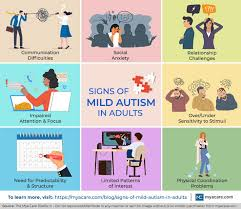When we think of autism, we generally think of children, but
adults may recognise the signs of autism in themselves often this will happen
once their child is diagnosed with being on the autism spectrum.
So, it is not surprising that many autistic adults are
undiagnosed.
Historically, autism was generally identified in children and
predominantly in males. These days we have a better understanding of autism and
its presentation across genders. This has led to better recognition of signs
that could indicate a person is autistic.
Recognising the signs of autism as an adult often comes through
personal reflection. You may initially learn about autism through a family
member or a friend who has been diagnosed. You may identify with their personal
journey and feel a connection with them.
Seeking and undertaking a formal diagnosis is very much a
personal choice. Some adults may want to get a diagnosis, but others will think
what’s the point at my age. Being diagnosed can be helpful when someone is
trying to work to their personal strengths. It can also bring a sense of
relief, recognising that you are just different and not defective or broken.
Learning more about yourself and autism will be beneficial
whatever pathway you choose.
There are two distinct pathways when seeking an adult diagnosis.
Assessments can be conducted by a psychologist, or by a psychiatrist, with
experience in assessing autism.
Both will conduct some form of standardised testing for autism
and other conditions, such as ADHD or mood disorders, and provide you with a
report.
However, there are some differences between the services and
support they can provide. A report from a psychiatrist may not be as detailed
as one from a psychologist.
Ensure you ask upfront what is entailed in the assessment and
report process.






We had never heard of autism years ago, and everyone seemed to be ok even those we knew so very well. It's an interesting subject, however.
ReplyDeleteThat's so true, I am learning more about such things
DeleteI'd really never given autism in adults any thought, assuming that most people outgrow it as they mature and learn to cope with their environment. Interesting, Jo-Anne.
ReplyDeleteSame here, I just never gave it a thought
DeleteI had no idea. Thank you for sharing this information. Hope you have a nice weekend.
ReplyDeleteYou're welcome
DeleteTo Martha Jane....You never outgrow autism. It is a neurological disorder. It's always there. If you are fortunate you try to make pathways around it.
ReplyDeleteI think many people think it is something someone will outgrow but nope you have it your whole life
DeleteYes, there are adults who were diagnosed with autism late. I think it's good to have a diagnosis, it can be helpful.
ReplyDeleteYes a diagnosis would be helpful but something many don't have
DeleteGetting help at whatever age is a good thing, I think. :)
ReplyDeleteYes a good thing
DeleteI find that interesting to think they can diagnosis an adult - you would have thought they would have known.
ReplyDeleteYes me too, you would think they would have known
DeleteMy sister has seven grandchildren, two of them, fully grown adults, autistic. Making their ways in the world, and managing it wonderfully.
ReplyDelete